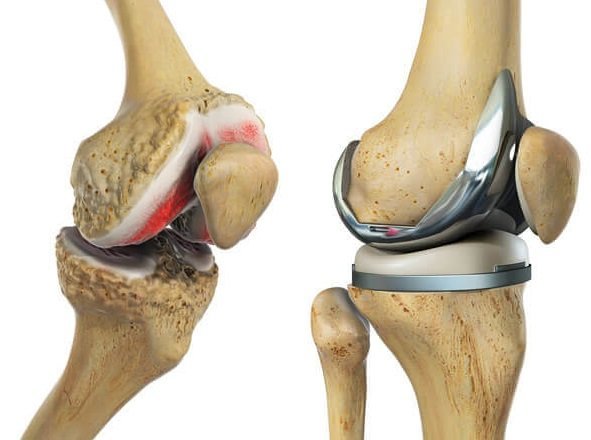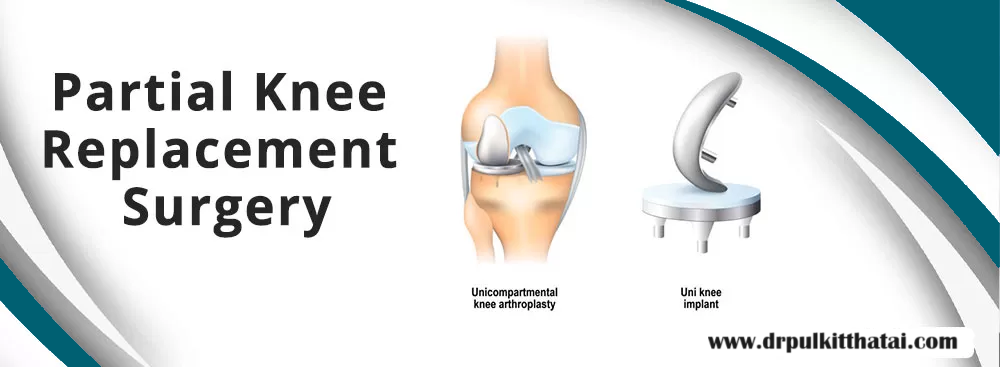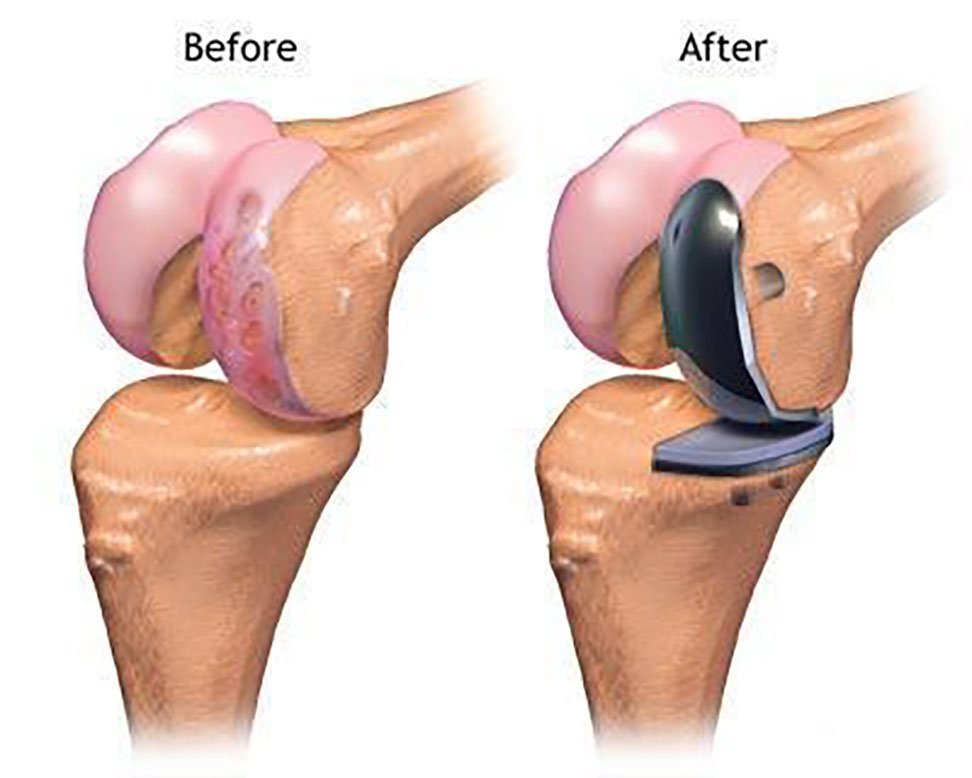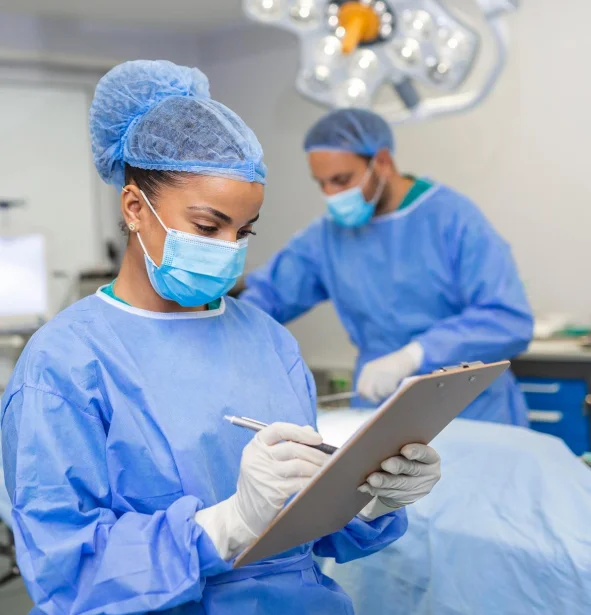Knee Replacement Surgery
Get the advanced Knee Replacement Surgery in Sri Ganganagar by Dr. (Major) Pulkit Thatai. Dr. Pulkit Thatai is most experienced Knee replacement Surgeon in Sri Ganganagar. Call now +91-

Partial Knee Replacement Surgery in Sri Ganganagar
Partial knee replacement, also known as unicompartmental knee arthroplasty, is a surgical procedure used to treat severe knee arthritis affecting only one part of the knee joint. It’s a less invasive option compared to total knee replacement, which involves replacing the entire knee joint.
During a partial knee replacement, only the damaged portion of the knee joint is replaced with a prosthesis, leaving the healthy bone and tissue intact. This procedure is typically recommended for patients with arthritis limited to one compartment of the knee, usually the medial (inner) compartment or the patellofemoral (front) compartment.
Candidates for Surgery
If your osteoarthritis has advanced and conservative treatments no longer alleviate your symptoms, your doctor may recommend knee replacement surgery. For individuals with osteoarthritis affecting either the inner (medial) or outer (lateral) compartments of the knee joint, partial knee replacement could be considered. Medial refers to the inner part of the joint, closest to the opposite knee, while lateral refers to the outer part, farthest from the opposite knee. Medial knee joint degeneration is the most common type of arthritis deformity. If knee pain persists despite anti-inflammatory medication and maintaining a healthy weight, knee replacement may be worth exploring.
To qualify for single-compartmental knee replacement, your arthritis must be limited to one part of your knee. Additionally, certain symptoms may disqualify you from this treatment, including inflammatory arthritis, significant knee stiffness, or ligament damage.

Best knee replacement surgeon in Sri Ganganagar

Benefits of Partial Knee Replacement Surgery
Partial knee replacement, also referred to as knee arthroplasty, is a precise and minimally invasive surgical procedure aimed at removing only the most damaged portions of the knee joint. However, it’s not suitable for patients experiencing knee stiffness or those with severe angular damage, as complete ligaments are typically necessary for this partial joint replacement. Additionally, individuals with rheumatoid arthritis are not eligible candidates for partial knee treatments, as this condition usually affects the entire joint due to its inflammatory nature. During the surgery, there is typically reduced blood loss, and patients tend to regain joint mobility faster compared to total knee replacement. The decision to undergo partial knee replacement is made collaboratively between the surgeon and the patient, considering various factors unique to each case. Selecting the right patient is crucial for ensuring a successful outcome and long-term functionality of the partial knee replacement. The primary goal of partial knee replacement is to alleviate severe knee pain. However, it offers several additional advantages over total knee replacement, including the preservation of healthy bone and ligaments, minimal muscle damage, reduced blood loss, decreased postoperative pain, quicker recovery, and improved range of motion in the knee joint.Recovery
During the surgical procedure, it’s common to experience some discomfort, but your surgeon and nurse will make every effort to ensure you feel as comfortable as possible. Various medications, such as opioids, non-steroidal anti-inflammatory drugs, and local anesthetics, are available to manage pain effectively, promoting relaxation and aiding in the body’s healing and recovery process. You’ll typically begin putting weight on your knee immediately after surgery, although you may require assistance from a walker, cane, or crutches during the initial days or weeks until you feel comfortable walking unaided. Recovery timelines vary for each patient and are influenced by factors such as the type of surgery, the type of implant used, and the patient’s overall health and age. While most patients can resume their daily activities within four to eight weeks post-surgery, some may return as early as one to two weeks. However, complete recovery may take anywhere from six to 12 months. Expect moderate surgical pain during the first few weeks of recovery as your knee heals. It’s essential to mobilize as soon as possible after surgery, ideally within the first 24 hours, to promote blood circulation and prevent complications. At Partani Clinic, you’ll receive expert consultation for your surgery, ensuring optimal results from your partial knee replacement procedure.
Knee Replacement Cost
Typically, when considering the costs associated with knee replacement, patients often encounter concerns. The total expense varies depending on the patient’s condition and the chosen healthcare provider. In addition to the patient’s condition, it’s essential to recognize that the overall expenses encompass various elements, including:
- Hospitalization
- In-hospital physical therapy
- Post-operative physical therapy
- Routine check-ups and follow-up appointments
- Transportation costs
Precautions and Recovery
After undergoing knee replacement surgery in Sri ganganagar, it is imperative for individuals to understand and adhere to necessary precautions to facilitate a smooth recovery process and prevent future complications. These precautions and recovery guidelines encompass:
- Refrain from engaging in strenuous exercises initially, opting for lighter physical activities instead.
- Limit stair climbing until complete relief is felt.
- Adhere to the prescribed diet regimen recommended by the doctor.
- Aim to maintain a healthy body weight.
- Attend scheduled check-up appointments regularly.
- Follow the doctor’s recommendation of resting for three to six weeks diligently.
How We Help You?
These are multiple reasons which can let you approach the doctor.
Dr. Pulkit Thatai stands out as one of Sri Ganganagar’s premier healthcare facilities. For those considering knee replacement surgery, scheduling an online appointment and reaching out to Dr. Pulkit Thatai is highly recommended.
Dr. Pulkit Thatai is renowned as one of Jaipur’s top knee replacement surgeons, delivering exemplary care at Dr. Pulkit Thatai Clinic. Proficient in utilizing cutting-edge techniques and German Joint Surgery Methods, he specializes in zero-error Joint Replacements.
Dr. Pulkit Thatai Clinic offers exceptional partial Knee Replacement Surgery, providing swift relief from pain for individuals dealing with conditions like osteoarthritis, rheumatoid arthritis, or injuries from accidents. Following the procedure, patients can expect to regain a healthy knee.
What distinguishes Dr. Pulkit Thatai Clinic is its accessibility to state-of-the-art technologies, testing, and treatment equipment, ensuring patients receive optimal care with efficiency. The clinic prioritizes patient well-being, promptly addressing any concerns post-surgery, such as severe knee pain, with immediate intervention and resolution.
Beyond diagnosis and treatment, Dr. Pulkit Thatai Clinic extends support to patients by guiding them through the necessary steps to manage their condition effectively. Dr. Pulkit Thatai and his team ensure open communication, actively listening to patients’ questions and concerns. In the event of surgery, they offer comprehensive pre- and post-operative guidance, ensuring patients are well-prepared for their procedures and recoveries.
